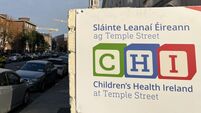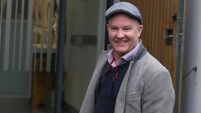Worrying signs of 'slippage' in public's behaviour, says Nphet

Professor Philip Nolan, chair of the Nphet Irish Epidemiological Modelling Advisory Group, said now is not the time for the public to 'relax in any way'. Picture: Stephen Collins/Collins Photos
There are worrying signs of “slippage” in the public's behaviour, and this could have an impact on the spread of the coronavirus, Professor Philip Nolan, chair of Nphet’s Epidemiological Modelling Advisory Group has warned.
Prof Nolan said the plea to the public is to "pull back" and “hold on” for a few more weeks to keep the virus suppressed.
"This is not the time to relax in any way," he warned.
Speaking on RTÉ's on Friday morning, he said: "In terms of those case counts, 500 a day, we're at twice what we were in December, 50 times what we were as we entered the summer last year and we've the same number of people in hospital now as we did at the peak in October."
"We've almost twice as many people in intensive care, as we did at the peak in October."
"We've made extraordinary progress, but we need to focus on the fact that the prevalence of the disease and the impact of the disease remains very high."
Prof Nolan said we are still in a stage where people must stay at home.
“This is not the time for mixing households or going back to the workplace unless it is essential work," he said.
There was a need to stick with the vaccination programme, he said, and the Government had the right set of parameters involving a range of metrics – lowering of the reproduction number, the status of the vaccination programme and the situation in hospitals.
Prof Nolan acknowledged that people have made “extraordinary sacrifices” and endured 52 weeks of living under restrictions, but he said there is a worry that if we "rush" the virus will not be suppressed.
While Prof Nolan warned that the country is in a "precarious" position with the virus, he said there are "sources of hope" also.
"The first source of hope is that over the last 10 weeks we have been successful in suppressing an extraordinary wave of disease, and the second beacon of hope is we've over 380,000 people who've received their first dose, 150,000 people who have received their second dose and that programme is accelerating."
“In 10 weeks we will be in a different scenario," he promised.
"People needed to maintain their guard against infection and not squander the sacrifices that have been made."





